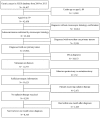The survival benefit of palliative gastrectomy and/or metastasectomy in gastric cancer patients with synchronous metastasis: a population-based study using propensity score matching and coarsened exact matching
- PMID: 30719157
- PMCID: PMC6360412
- DOI: 10.7150/jca.28842
The survival benefit of palliative gastrectomy and/or metastasectomy in gastric cancer patients with synchronous metastasis: a population-based study using propensity score matching and coarsened exact matching
Abstract
Introduction: Palliative surgeries were controversial for asymptomatic metastatic gastric cancer (mGC) patients. This study was aimed to evaluate survival benefit of palliative surgeries to gastric and/or metastatic tumors in mGC patients based on U.S population. Materials and Methods: A total of 8345 gastric cancer patients diagnosed with synchronous distal metastasis between 2004 to 2013 from the Surveillance, Epidemiology, and End Results Program (SEER) database were divided into four groups according to surgery strategies: surgeries to both primary and metastatic tumors (SPM), gastrectomy only (GO), metastasectomy only (MO) and no surgery performed (NS). Their clinicopathological characteristics and overall survival (OS) were analyzed before and after propensity score matching (PSM) and coarsened exact matching (CEM). Results: The median OS of SPM and GO patients was both significantly higher than NS patients (11 months vs. 8 months vs. 5 months; P<0.001, respectively) while that of MO was not (6 months vs. 5 months; P= 0.286). In comparisons between surgery strategies, survival benefit was similar between SPM and GO groups (P=0.389) and both showed significantly better survival than MO patients (P<0.001). All surgery strategies were proved to be favorable prognostic factors over non-surgical treatment (Hazard ratio (HR) for SPM: 0.60, P<0.001; HR for GO: 0.62, P<0.001; HR for MO: 0.91, P=0.046). Similar results were obtained after matching by PSM and CEM except that prognostic impact of MO deteriorated. Conclusions: Gastrectomy plus metastasectomy or gastrectomy alone could be adopted as a choice of improving survival in the U.S population. Metastasectomy alone is not generally recommended.
Keywords: gastrectomy; gastric cancer; matching; metastasectomy; survival.
Conflict of interest statement
Competing Interests: The authors have declared that no competing interest exists.
Figures




References
-
- Siegel R, Ma J, Zou Z, Jemal A. Cancer statistics, 2014. CA: A Cancer Journal for Clinicians. 2014;64:9–29. - PubMed
-
- Edwards BK, Noone AM, Mariotto AB, Simard EP, Boscoe FP, Henley SJ. et al. Annual Report to the Nation on the status of cancer, 1975-2010, featuring prevalence of comorbidity and impact on survival among persons with lung, colorectal, breast, or prostate cancer. Cancer. 2014;120:1290–314. - PMC - PubMed
-
- Shridhar R, Almhanna K, Hoffe SE, Fulp W, Weber J, Chuong MD. et al. Increased survival associated with surgery and radiation therapy in metastatic gastric cancer. Cancer. 2013;119:1636–42. - PubMed
-
- Waddell T, Verheij M, Allum W, Cunningham D, Cervantes A, Arnold D. Gastric cancer: ESMO-ESSO-ESTRO clinical practice guidelines for diagnosis, treatment and follow-up. European journal of surgical oncology: the journal of the European Society of Surgical Oncology and the British Association of Surgical Oncology. 2014;40:584–91. - PubMed
-
- Gold JS, Jaques DP, Bentrem DJ, Shah MA, Tang LH, Brennan MF. et al. Outcome of patients with known metastatic gastric cancer undergoing resection with therapeutic intent. Annals of surgical oncology. 2007;14:365–72. - PubMed
LinkOut - more resources
Full Text Sources
Miscellaneous

